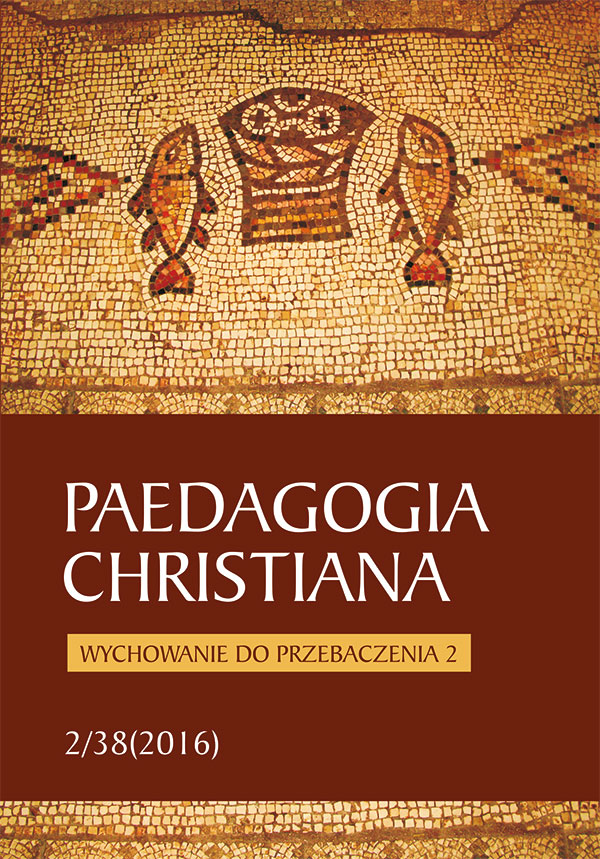Forgiveness in Education
DOI:
https://doi.org/10.12775/PCh.2016.021Keywords
forgiveness, reconciliation, compassion, value, educationAbstract
Forgiveness is the essential problem of human life and education, which came into existence together with Christianity. This is the most human fact, proving the size of human nature, also perceived as the symptom of weakness and the lack of courage. The formulations of forgiveness are discussed in the light of psychological, social, environmental, or sometimes also philosophical, and mostly theological aspects. The article, starting from the description of the fact of forgiveness and its etymological and anthropological interpretation, shows the shape of the man who is naturally condemned to the possibility of making mistakes and the necessity of forgiveness as the value to which one should and can be educated on. Places and the environment of education are, above all, the family, then school and different educational institutions, and also the Church – as the community of believers.
The properly formed moral consciousness requires learning and mastering specific knowledge, internalization of forgiveness as a principle of morality and as a value, through identification with real or literary persons, or the historical heroes who manifest this kind of attitude of forgiveness.
Educational, didactic and catechistic programmes should make up the essential element of the promotion of the value of forgiveness and the aid of the human development. The indispensable endeavor is to experience the reconciliation in these environments, as realities of everyday life with the presence of such attitudes as: the ability of the acknowledgement of the fault, repentance, the decision of the improvement, the desire of the fulfilment. In relation to the Church as the educational environment promoting forgiveness it has been shown that it should first become the reconciled Church thus the community of Christ's pupils united with the duty of continuous conversion to God and efforts to live a life worthy of the new people. All members of the Church should work on calming their minds, reducing tensions, overcoming divisions, healing the wounds which appear when there are differences of positions and discussion, acting according to the well-known from the Christian antiquity principle: “Liberty in doubtful things, unity in necessary thins, charity in all things” (In dubiis libertas, in necessariis unitas, in the omnibus caritas). The educational environment of the Church transforms the historical situation of hatred and violence in the civilization of love. The present world, missing forgiveness and better reality, admits the possibility of making mistakes, simultaneously, perceiving the necessity of forgiveness and the experiencing it in life.
References
Duquoc, Christian, Casiano Floristán. „Il perdono”. Concilium 2 (1986): 2–28.
Enright, Robert D., Elisabeth A. Gassin, Ching-Ru Wu. „Forgiveness: a developmental view”. Journal of Moral Education 2 (1992): 99–114.
Franciszek. Miłosierdzie to imię Boga. Kraków: Znak, 2015.
Giulianini, Annalisa. O przebaczeniu, czyli jak uleczyć duszę. Kraków: Wydawnictwo Bratni Zew, 2010.
Guardini, Romano. Bóg. Nasz Pan Jezus Chrystus – Osoba i życie, tłum. Juliusz Zychowicz. Warszawa: Apostolicum, 1999.
Jan Paweł II. Przemówienie Pojednanie chrześcijańskie i ludzka wspólnota. Loreto, 11.04.1985.
Jan Paweł II. Adhortacja apostolska Reconciliatio et paenitentia. Roma: Libreria Editrice Vaticana, 1984.
Lambert, Jean i in. Pardonner. Bruxelles : Facultés Universitaires Saint-Louis, 1994.
Le sacrement du pardon entre hier et demain, red. Louis-Marie Chauvet, Paul De Clerck. Paris: Desclé, 1993.
Mały słownik języka polskiego, red. Stanisław Skorupka, Halina Auderska, Zofia Łempicka. Warszawa: PWN, 1969.
Marcel, Gabriel. Homo viator. Roma: Borla, 1980.
Maryniarczyk, Andrzej. „Homo Viator”. Człowiek w Kulturze 23 (2013): 29–35.
Nanni, Carlo. Educare cristianamente. Lettere spirituali a educatori, insegnanti e formatori. Leumann–Torino: Elledici, 2005.
Orzeszyna, Jan. „Jan Paweł II. Pojednanie z Bogiem i pojednanie między ludźmi”. W: Wielka Encyklopedia Nauczania Jana Pawła II, 11–16. Radom: Polskie Wydawnictwo Encyklopedyczne, 2014.
Orzeszyna, Jan. „Pojednanie”. W: Jan Paweł II. Encyklopedia Nauczania Moralnego, red. Janusz Nagórny, Krzysztof Jeżyna, 393–396. Radom: Polskie Wydawnictwo Encyklopedyczne, 2005.
Popiełuszko, Jerzy. „Homilia z dnia 26 grudnia 1982 r.”. http://xj.popieluszko.pl/xjp/teksty-kazan/8450,26-grudnia-1982.html.
Schepens, Jacques. “Perdono”. W: Dizionario di scienze dell’educazione, red. José M. Prellezo, Guglielmo Malizia, Carlo Nanni, 812–813. Torino: ElleDiCi – SEI, 1997.
Sienkiewicz, Henryk. Quo vadis. Warszawa: PIW, 1961.
Downloads
Published
How to Cite
Issue
Section
Stats
Number of views and downloads: 985
Number of citations: 0



